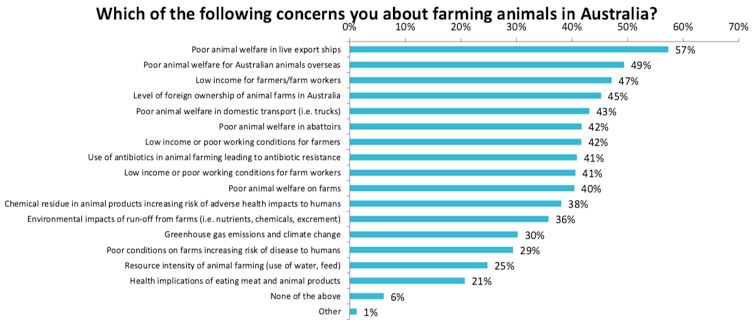Not just activists, 9 out of 10 people are concerned about animal welfare in Australian farming
- Written by Paul McGreevy, Professor of Animal Behaviour and Animal Welfare Science, University of Sydney
Recent protests by animal welfare activists on Australian abattoirs and farms and city streets triggered a backlash from meat-lovers and MPs. The activists were labelled “un-Australian” by the Prime Minister and others, and the protests prompted calls for tougher trespass laws and penalties.
Protests have continued more recently, with a Perth restaurant targeted earlier this month.
But it’s not just activists who are concerned about animals. A recent report commissioned by the federal Department of Agriculture and Water Resources suggests it’s the majority of Australians who care about animal welfare.
Read more: Vets can do more to reduce the suffering of flat-faced dog breeds
The report included a survey of 1,521 people: 95% of respondents viewed farm animal welfare with concern, and 91% want reform to address this.
The report – Australia’s Shifting Mindset on Farm Animal Welfare by consultancy firm Futureye – also says the department “currently has very limited powers over farm animal welfare”, raising the potential for “outrage […] if the community sees the government as not responding to concerns and expectations”.
That could be a problem for whoever wins control of government after the weekend’s federal election.
What’s the concern?
The report did receive some coverage when it was released in March, but this was largely among farming and activist groups. It’s timely to delve deeper into some of the findings.
The survey group was split 50/50 on gender; covered a range of age groups and locations, both city and rural, across Australia; and included meat and non-meat eaters.
Issues such as poor animal welfare in live export – which has received plenty of media coverage – were of highest concern (57% of respondents), followed by concerns over low income for farmers and farm workers (47%).
 From the report Australia’s Shifting Mindset on Farm Animal Welfare.
Futureye/Screengrab
From the report Australia’s Shifting Mindset on Farm Animal Welfare.
Futureye/Screengrab
The report highlights people’s concern over poor animal welfare in abattoirs (42%) and on farms (40%). The lowest concern mentioned was any health implications from eating meat and animal products (21%).
The report also confirms the public’s appreciation that the low price of animal products can constrain a producer’s ability to maintain good animal welfare standards and the government’s ability to enforce them.
Consumers want reform
Most respondents in the survey saw the government as chiefly responsible for ensuring animal welfare standards, and 40% see the need for “significant reform”. They suggested various actions for improvement, such as:
- a minimum standard set by government
- incentivising farmers for good animal welfare
- better education of the public about agricultural practices in terms of awareness-raising
- standardisation of product labels such as free-range.
Focus group discussions revealed many respondents were concerned that the Department of Agriculture and Water Resources has a conflict of interest when both supporting the agricultural industry and promoting good animal welfare standards.
Consumers want greater transparency about animal welfare practices and more consistent information so they can make informed decisions. The report found 42% of respondents said there was too much conflicting information about animal welfare, and 40% wanted more information.
Most respondents assumed products labelled cage-free, free-range and organic reflected better animal welfare standards, but they did not always trust these labels. One of the solutions raised from focus group discussions was a trusted certification and labelling process to help consumers differentiate products.
How animal welfare meets politics
Clearly people are concerned about animal welfare – and the report says concern has been growing over the years, and shows no sign of abating.
It predicts that more exposés, negative media focus on farm animal welfare, and a perceived lack of governmental responsiveness will intensify public outrage and demand for reform.
People want something done about animal welfare, and they’re looking towards government to act. So what can government do?
The report says one of the best indicators to explain the growing concern for farm animal welfare was the public’s views on animal sentience – the capacity to experience suffering and pleasure. Less than 10 per cent of those surveyed believed cattle, sheep, goats and pigs are not sentient.
Animal sentience is recognised in New Zealand’s Animal Welfare Act and also in the draft ACT Animal Welfare Act here in Australia.
Sentience is currently enshrined in European Union law but not into UK law, yet.
In the UK, and in anticipation of Brexit, an animal welfare bill is being considered. If approved, it will increase the maximum sentence for animal cruelty from six months to five years.
What about Australia? We suggest that Australian politicians take note.
The Animal Justice Party is campaigning on animal welfare reform and already holds two seats in the New South Wales upper house and one in the Victorian upper house. It has candidates running for the Senate in the federal election.
What consumers need to know
There is also a clear need to inform consumers on the science of animal welfare. Even the Futureye report warns about “uninformed” people being drawn into any animal welfare debate.
Read more: How fake news gets into our minds, and what you can do to resist it
Now, more than ever, consumers need to understand the basic scientific and ethical frameworks that shape current attitudes to animals and animal welfare.
That way they can then assess whether animals are experiencing good welfare, and the way in which practices, policies, legislation and the views of different stakeholders affect animal welfare.
Such tools would allow us all to evaluate information on animal welfare issues, discover why animal protection has been called the “social justice issue whose time has come”, and empower us to make informed decisions on animal welfare issues.
Authors: Paul McGreevy, Professor of Animal Behaviour and Animal Welfare Science, University of Sydney



















